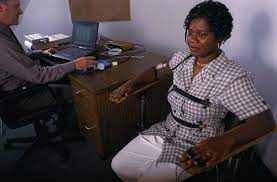Trust is the cornerstone of a healthy marriage, providing the foundation for emotional security and intimacy. When trust is challenged, especially by suspicions of infidelity or dishonesty, partners may seek various methods to uncover the truth. Among these methods, lie detector tests—also known as polygraph tests—are sometimes used to determine a wife’s truthfulness. While a polygraph test might offer a seemingly straightforward solution, it raises significant ethical, emotional, and practical considerations This article examines the use of lie detector tests for a wife, discussing both the potential advantages and the considerable challenges involved.

How Lie Detector Tests Work
Lie detector tests measure physiological responses that are thought to correlate with deception. These responses include variations in heart rate, blood pressure, respiration, and skin conductivity. During the test, the subject answers a series of questions while these physiological indicators are monitored. The premise is that deceptive answers will produce noticeable physiological changes compared to truthful responses.
Reasons for Considering a Lie Detector Test for a Wife
Desire for Clarity: In situations where infidelity or dishonesty is suspected, a lie detector test can seem like a way to obtain definitive evidence and resolve doubts.
Immediate Results: Unlike counseling or prolonged discussions, a polygraph test offers quicker results, which can be appealing to those seeking swift answers.
Perceived Impartiality: Administered by a professional, a lie detector test can be viewed as an unbiased method for verifying the truth, potentially minimizing conflicts rooted in personal biases.
Ethical and Practical Concerns
Accuracy and Reliability: The accuracy of lie detector tests is a topic of debate. Critics argue that these tests can produce false positives (indicating deception when there is none) and false negatives (failing to detect deception), leading to misleading conclusions.
Emotional Impact: Undergoing a lie detector test can be emotionally stressful and humiliating. This process can exacerbate existing trust issues and add further strain to the relationship.
Consent and Coercion: It is essential that both partners agree to the test willingly. Any form of coercion can undermine the validity of the test and potentially damage the relationship further.
Privacy and Ethical Considerations: The use of polygraph tests in personal relationships raises ethical questions about privacy and the appropriateness of such invasive measures.
Potential Benefits of Lie Detector Tests
Truth Verification: In some cases, a lie detector test can provide clarity and confirm the truth, helping individuals make informed decisions about their relationship.
Resolution of Conflicts: When other methods fail to resolve suspicions, a polygraph test might offer an additional perspective and facilitate moving forward.
Deterrence: The possibility of taking a lie detector test might deter some individuals from engaging in deceitful behavior, knowing their actions could be scrutinized.
Alternatives to Lie Detector Tests
Marriage Counseling: Professional counseling offers a supportive and constructive environment for addressing marital issues. Therapists can help couples work through their emotions, rebuild trust, and improve communication.
Open Communication: Honest and transparent dialogue is crucial in resolving trust issues. Partners should aim to express their concerns, feelings, and fears openly and constructively.
Gradual Trust-Building: Rebuilding trust takes time and consistent effort. Couples should focus on demonstrating trustworthy behavior and working together to enhance their relationship.
Conclusion
While a . Lie Detector Test for Wife might appear to be a direct approach to uncovering the truth, it involves significant ethical, emotional, and practical challenges. The accuracy of these tests is not infallible, and their use can lead to additional emotional harm and deepen existing trust issues. Exploring alternatives such as marriage counseling, open communication, and gradual trust-building offers more constructive and sustainable methods for addressing marital concerns. Ultimately, the decision to use a lie detector test should be made with careful consideration of its potential impact on the relationship and the well-being of both partners.
